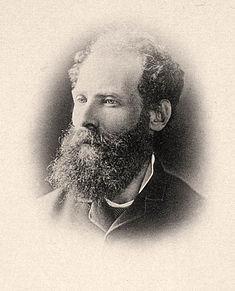
Back انتيرو دى كوينتال ARZ Antero de Quental Catalan Antero de Quental Czech Antero de Quental German Antero de Quental Esperanto Antero de Quental Spanish Antero de Quental Basque Antero de Quental Finnish Antero de Quental French Antero de Quental Galician
Antero de Quental | |
|---|---|
 Quental c. 1887 | |
| Born | Anthero Tarquínio de Quental 18 April 1842 Ponta Delgada, São Miguel, Portugal |
| Died | 11 September 1891 (aged 49) Ponta Delgada, São Miguel, Portugal |
| Resting place | Ponta Delgada, São Miguel |
| Occupation | Poet |
| Language | Portuguese |
| Nationality | Portuguese |
| Alma mater | University of Coimbra |
| Period | 1861–1892 |
| Genre | Odes, Sonnets |
| Subject | Revolution, Nature |
| Literary movement | Questão Coimbrã, Romanticism, Socialist Experimentalism |
| Notable works | Sonetos de Antero (1861), Beatrice e Fiat Lux (1863), Odes Modernas (1865), Bom Senso e Bom Gosto (1865), A Dignidade das Letras e as Literaturas Oficiais (1865), Defesa da Carta Encíclica de Sua Santidade Pio IX (1865), Portugal perante a Revolução de Espanha (1868), Primaveras Românticas (1872), Considerações sobre a Filosofia da História Literária Portuguesa (1872), A Poesia na Actualidade (1881), Sonetos Completos (1886), A Filosofia da Natureza dos Naturistas (1886), Tendências Gerais da filosofia na Segunda Metade do Século XIX (1890), Raios de extinta luz (1892), Prosas |
| Signature | |
Antero Tarquínio de Quental (European Portuguese: [ɐ̃ˈtɛɾu ðɨ kẽˈtal]; old spelling Anthero; 18 April 1842 – 11 September 1891) was a Portuguese poet, philosopher, and writer. Quental is regarded as one of the greatest poets of his generation and is recognized as one of the most influential Portuguese language artists of all time. His name is often mentioned alongside Luís Vaz de Camões, Manuel Maria Barbosa du Bocage, and Fernando Pessoa.[1]
- ^ Simões, Manuel, "Antero de Quental", UP (in Portuguese), Lisbon, Portugal: TAP Portugal/Lisgráfica - Impressão e Artes Gráficas, SA, pp. 146–147